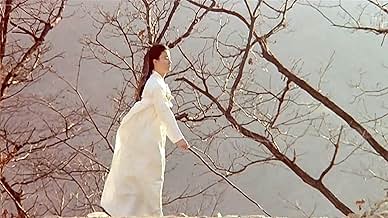Seopyeonje
- 1993
- 1h 52min
VALUTAZIONE IMDb
7,5/10
1185
LA TUA VALUTAZIONE
Aggiungi una trama nella tua linguaDespite its falling popularity, a father teaches his two children the Korean musical tradition of Pansori (one singer accompanied by one drummer).Despite its falling popularity, a father teaches his two children the Korean musical tradition of Pansori (one singer accompanied by one drummer).Despite its falling popularity, a father teaches his two children the Korean musical tradition of Pansori (one singer accompanied by one drummer).
- Premi
- 22 vittorie e 9 candidature totali
Recensioni in evidenza
Sopyonje brought me to my knees before a tradition that previously was unknown to me - pansori. The power, tenderness, and pain that lies in art, in life, longing, and the music was conveyed in full force and with beauty. I couldn't directly understand the Korean words (subtitled) that were spoken or the songs that were sung, but i could feel and was in awe of the emotions especially in the second half of the movie. I can still hear the melodies, voice, and the drum.
10happymin
I truly believe that this is the best film ever made in Korea until this date (1999). But it may be too difficult to grasp the film's true beauty for most Westerners who are foreign to Korean "chang" which is traditional Korean folk singing.
Every time you look at this wonderful movie, be sure not to be disturbed by anything or by anyone. Especially if you are looking for the first time! In this case, it may be you find it boring for a short while, but don't you dare to give up! You must realize that the "slow motion" of this movie and the long silences are exactly some of the characteristics that make it one of the most wonderful movies I ever saw. You WILL find extraordinary contrasts at certain times. IN ANY CASE, KEEP CONCENTRATED AND CONTINUE LOOKING TILL THE VERY END!! You will not regret! I am a man, 55 years old, father of two big boys, and I am not ashamed to say that every time I look at this movie a few tears run over my cheeks... Thank you so much, I'm Kwon Taek !
Sopyonje deals with a a cultural music called Pansori. Until I saw this film I knew nothing about it, but now I appreciate its Beauty and History. If you are looking for a movie that talks greatly about Korean Culture, this is it.
One of the very best films to come out of South Korea. SOPYONJE tells the tale of pansori singers trying to survive in a world that no longer cares about them. The plight of the pansori singers is an allegory for traditional South Korea, a country being overrun by modernization and the Western world in the aftermath of World War II.
The film's soundtrack alone is worth watching. I've never heard such haunting and beautiful singing in my life. Truly, a masterpiece that deserves to be remembered.
10 out of 10
(go to www.nixflix.com for a more detailed review of this film and reviews of other foreign movies)
The film's soundtrack alone is worth watching. I've never heard such haunting and beautiful singing in my life. Truly, a masterpiece that deserves to be remembered.
10 out of 10
(go to www.nixflix.com for a more detailed review of this film and reviews of other foreign movies)
Lo sapevi?
I più visti
Accedi per valutare e creare un elenco di titoli salvati per ottenere consigli personalizzati
Dettagli
Botteghino
- Lordo in tutto il mondo
- 192 USD
Contribuisci a questa pagina
Suggerisci una modifica o aggiungi i contenuti mancanti

Divario superiore
By what name was Seopyeonje (1993) officially released in Canada in English?
Rispondi


















